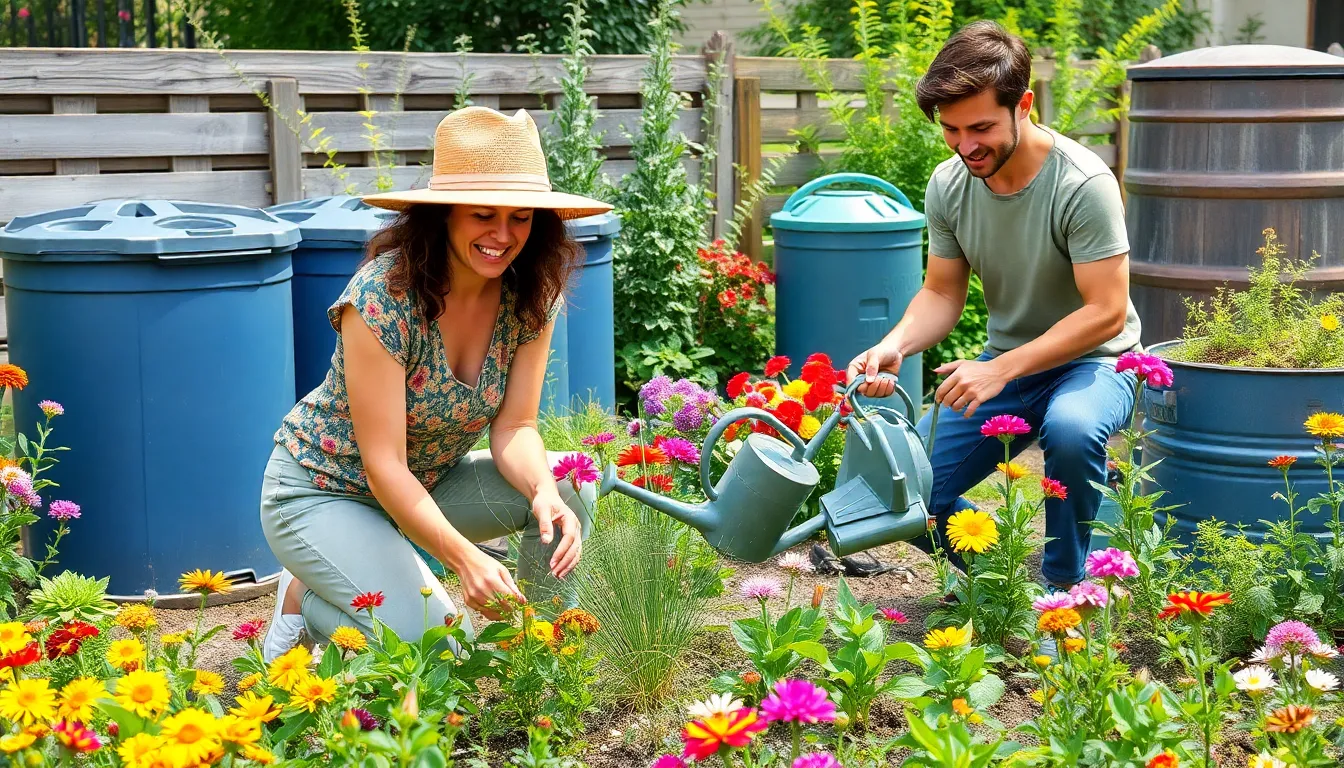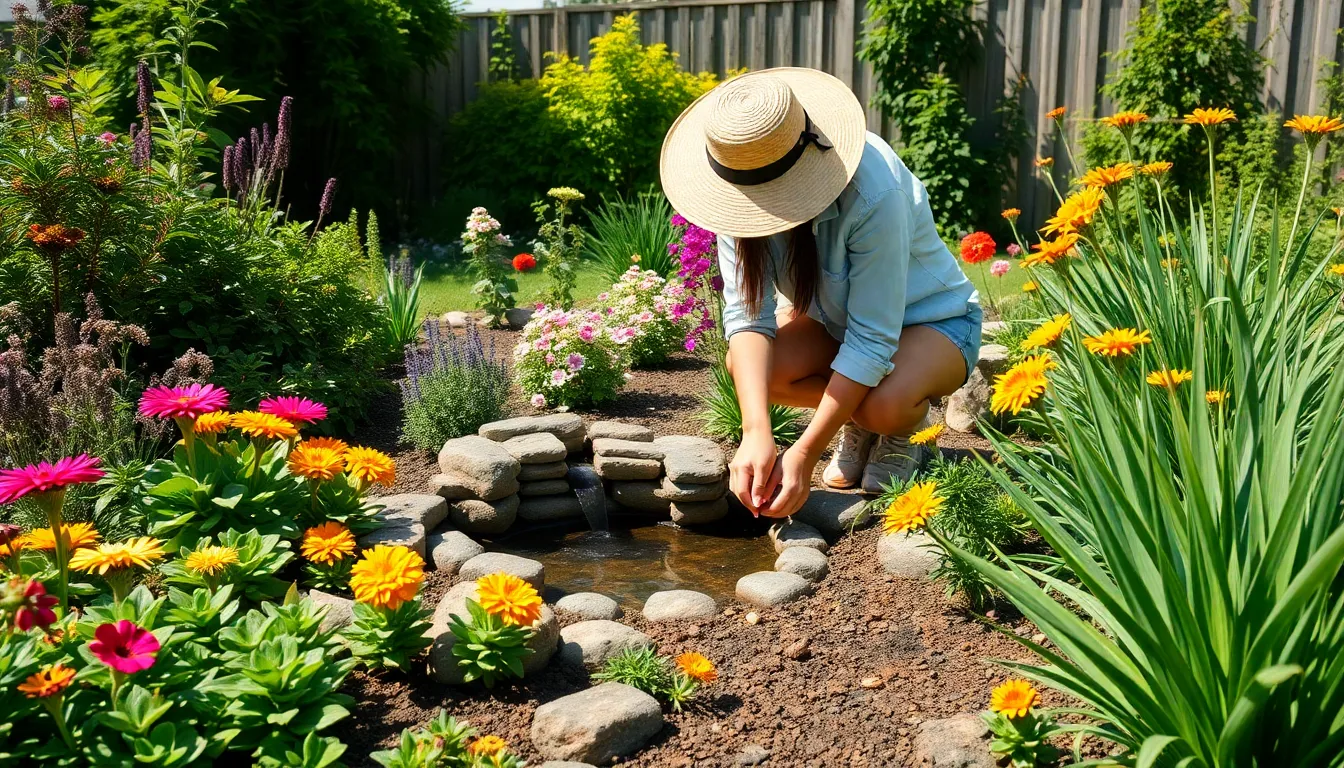Physical Address
304 North Cardinal St.
Dorchester Center, MA 02124
Physical Address
304 North Cardinal St.
Dorchester Center, MA 02124

Imagine a garden that not only looks stunning but also plays nice with Mother Nature. Sustainable gardening is the secret sauce that allows anyone to cultivate a green paradise while keeping the planet happy. It’s all about growing plants in a way that’s environmentally friendly, economically viable, and socially responsible.
Sustainable gardening refers to cultivating plants in ways that support ecological balance and conserve resources. This type of gardening focuses on practices that promote biodiversity and minimize environmental impact. Techniques include using organic fertilizers and pesticides, which reduce chemical runoff. In addition, sustainable gardeners often incorporate composting. This practice enriches soil while reducing waste.
Choosing native plants plays a crucial role in sustainability. Native species require less water and are more resilient to local pests. Gardeners can also implement crop rotation to maintain soil health and reduce disease buildup. All these practices contribute to a thriving garden ecosystem.
Water conservation methods are essential in sustainable gardening. Rainwater harvesting allows gardeners to collect and utilize natural precipitation. Drip irrigation systems ensure efficient water delivery directly to the plant roots. Both methods help conserve this vital resource.
Integrating permaculture principles enhances sustainability. Designing gardens that mimic natural ecosystems fosters self-sufficiency and resilience. Additionally, fostering beneficial insects and pollinators creates a balanced environment. By attracting birds, bees, and butterflies, gardeners support overall biodiversity.
By prioritizing sustainability, gardeners can create beautiful spaces that offer environmental benefits and enhance personal well-being. Ultimately, sustainable gardening represents a commitment to a healthier planet.

Sustainable gardening relies on core principles that enhance ecological health and resource efficiency. Adopting these principles fosters a thriving garden while contributing to environmental well-being.
Environmental conservation plays a vital role in sustainable gardening practices. Utilizing organic fertilizers reduces chemical runoff and promotes healthier soil. Composting organic waste cuts down on landfill contributions and enriches soil nutrition. Implementing water-saving techniques, such as rainwater harvesting, captures and stores rainfall for garden use. Employing drip irrigation systems delivers water directly to plant roots, enhancing water efficiency. Each of these methods results in lower resource consumption, supporting a healthier ecosystem for future generations.
Biodiversity promotion enhances garden resilience and ecological balance. Planting native species that are well-adapted to the local environment fosters a thriving habitat. Attracting beneficial insects, such as bees and ladybugs, increases pollination and pest control. Utilizing companion planting strategies can deter pests and improve plant health, maximizing yields. Maintaining a diverse selection of plants encourages various habitats, supporting wildlife and beneficial microorganisms. Consequently, promoting biodiversity creates a robust ecosystem that thrives in harmony with nature.
Sustainable gardening offers numerous advantages, promoting both environmental health and personal well-being. It leads to healthier ecosystems and enhances overall garden vitality.
Healthy plants thrive within a sustainable gardening framework. By using organic fertilizers, gardeners reduce chemical exposure, allowing plants to develop resilience against pests and diseases. Native plants typically adapt well to local conditions, requiring less maintenance and fewer resources. Encouraging beneficial insects, such as ladybugs and bees, creates a natural balance that supports plant health. Diverse plant selections also foster a more stable ecosystem, allowing various species to thrive together. Well-managed gardens not only produce vibrant blooms but also yield nutritious fruits and vegetables that directly benefit human health.
Improving soil quality is essential in sustainable gardening. Composting enriches soil, providing essential nutrients while minimizing waste. Microorganisms thrive in well-aerated soil, enhancing its structure and fertility. Utilizing organic matter replenishes crucial minerals and increases moisture retention, reducing irrigation needs. Crop rotation diversifies soil nutrients, promoting a more balanced ecosystem. Mulching helps control weeds and maintains consistent soil temperature, creating an optimal environment for plant roots. Organic practices establish a living soil that supports healthy plant growth, leading to a thriving garden ecosystem.
Sustainable gardening employs various techniques that promote ecological balance, conserve resources, and enhance the overall health of gardens. Key practices contribute to effective gardening while supporting the environment.
Composting enriches soil by recycling organic waste into nutrient-rich material. It reduces landfill waste while providing essential nutrients for plants. Microorganisms break down kitchen scraps and yard waste, facilitating continuous soil improvement. This process enhances soil structure, promotes water retention, and improves drainage. Furthermore, using compost diminishes reliance on chemical fertilizers, fostering a healthier ecosystem in the garden. Gardeners achieve better results by adding compost to planting areas, benefiting plants and the environment alike.
Choosing native plants offers significant advantages for sustainable gardening. These plants require less maintenance and are well adapted to local climates. Additionally, native species attract beneficial insects, contributing to natural pest control. Their deeper root systems enhance soil stability and prevent erosion. Emphasizing biodiversity, native plants create habitats for wildlife while requiring fewer resources. Sustainable gardens thrive with these plants, as they often resist disease and pests, leading to a more resilient ecosystem. Prioritizing native selections invites a harmonious relationship between garden spaces and local ecosystems.
Sustainable gardening presents several challenges that gardeners must navigate. Understanding these obstacles helps in implementing effective strategies.
Pest management poses a significant hurdle in sustainable gardening. Natural pest control methods, such as introducing beneficial insects, often take time to establish. Certain pests can quickly damage crops, complicating the reliance on organic methods. Rotating crops remains a valuable strategy; it disrupts pest life cycles. Timing for planting also affects pest prevalence, necessitating careful planning. Gardeners must also monitor pest populations regularly to identify outbreaks promptly. Embracing companion planting can enhance natural defenses, as specific plants deter pests while benefiting their neighbors. Continuous education and adaptation allow gardeners to develop more effective solutions over time.
Climate variation impacts sustainable gardening practices significantly. Changing weather patterns can affect plant growth and soil health. Drought conditions lead to increased water scarcity, challenging irrigation methods employed in gardens. Adjusting planting schedules helps align with fluctuating seasons. Increased rainfall may cause soil erosion or waterlogging, making drainage solutions essential. Selecting drought-resistant and climate-adapted plants contributes to resilience. Using mulch retains soil moisture, combating evaporation during hotter months. Establishing diverse plant species enhances stability in unpredictable conditions. Flexibility and informed decision-making empower gardeners to thrive regardless of climate challenges.
Sustainable gardening represents a powerful approach to nurturing both gardens and the environment. By adopting eco-friendly practices and prioritizing biodiversity, gardeners can create thriving ecosystems that benefit all. The techniques discussed not only enhance soil health but also promote resilience against pests and diseases.
Through mindful choices such as composting and selecting native plants, individuals can cultivate beautiful spaces that align with nature. Embracing sustainability in gardening is more than a trend; it’s a commitment to fostering a healthier planet. As gardeners embrace these principles, they contribute to a more balanced and vibrant world for future generations.